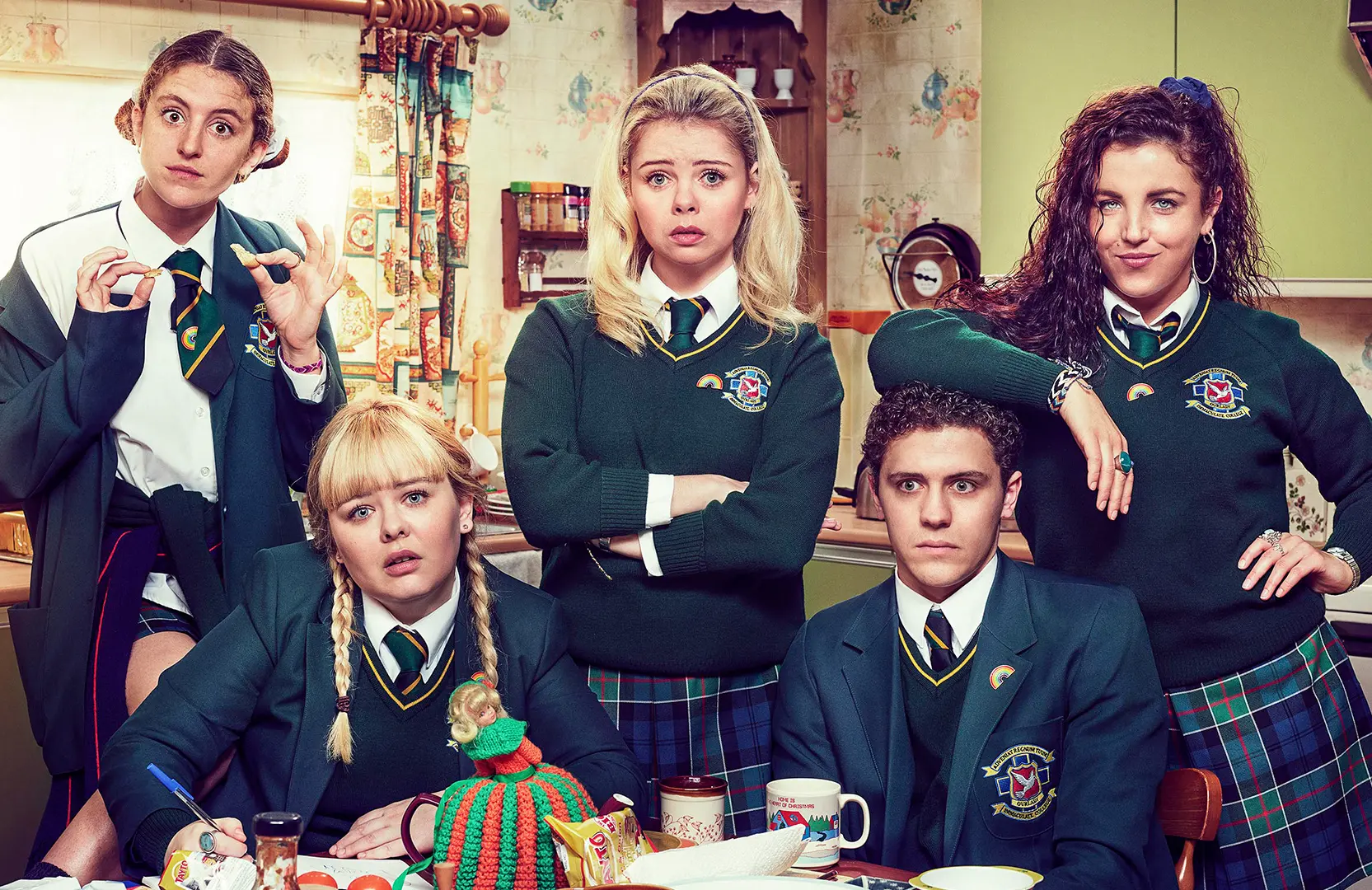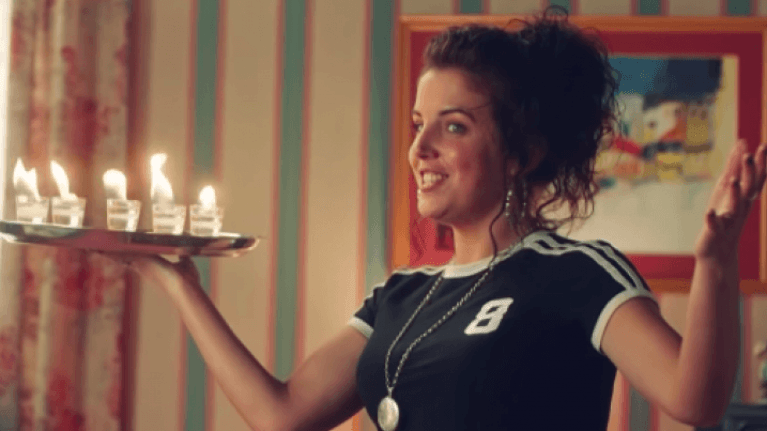Raunchy Laughs Are Northern Ireland’s Latest Export
-
 Left to right, Orla (Louisa Harland), Clare (Nicola Coughlan), Erin (Saoirse-Monica Jackson), James (Dylan Llewellyn), and Michelle (Jamie-Lee O'Donnell) in Derry Girls (Channel 4/Netflix)
Left to right, Orla (Louisa Harland), Clare (Nicola Coughlan), Erin (Saoirse-Monica Jackson), James (Dylan Llewellyn), and Michelle (Jamie-Lee O'Donnell) in Derry Girls (Channel 4/Netflix)Derry Girls
Watch Season 1 on Netflix
Season 2 drops August 2ndThe transformation of TV hasn’t been a revolution so much as a string of smaller upheavals. Take the globalization of content. In the old days a distribution company might sell the rights to a classic show like The Honeymooners to the Swedes or the Poles or the Venezuelans, who would then make their own episodes based on the original scripts, but with local color and talent. The supply chain went in reverse, too — Norman Lear made a career out of acquiring Britcoms and turning them into hits like Sanford and Son, and NBC famously adapted The Office (and infamously Coupling).
Sometimes a foreign hit would make its way to our shores in its original form, but most were permanently walled off from the rest of the world. In my newspapering days I sometimes used a VPN service and impersonated an Internet user in another country just to watch a show I’d heard about.
The walls had been crumbling for a while when Netflix knocked them down in 2016, expanding overnight to nearly 200 countries. As it began testing hit shows from Country A on viewers in Country B, it was able to confirm what I already knew — good TV knows no borders. Netflix relies on its long tail of content to keep subscribers happy, so why not add foreign programs to the mix? Thus viewers of Narcos, a Netflix original with a lot of Spanish-language dialogue, might see recommendations for telenovelas that were picked up on the cheap from Central and Latin America. (I can’t even imagine what you had to be watching to get a recommendation for Shtisel.)
Derry Girls, a raunchy comedy about five working-class Catholic schoolkids in 1990s Northern Ireland, debuted last year and quickly became that country’s most-watched TV show of the DVR era, including two-thirds of all young adult viewers. The show began streaming on Netflix in the States in late 2018; as of this writing, Metacritic and most popular recap sites have overlooked it.
The genre is nostalgic high-school sitcom, one that any American will recognize. But Derry Girls creator Lisa McGee has thrown enough quirky new elements into the mix that it all comes out fresh and interesting. Kind of reminds me of another show from the ’90s that we were watching last year at this time, only this one has brogues so thick, even some Irish viewers were complaining about it being hard to follow. (Turn on the subtitles, and audio description, and you won’t miss a punchline.)
McGee has bet big on the idea that tragedy plus time equals absurdity. Derry, formally Londonderry, a heavily Catholic town located just inside the border with the Republic of Ireland, was one of the most radically anti-British towns at the peak of Northern Ireland’s civil war, or “troubles” (as they refer to the period). It was here that soldiers killed unarmed protestors on a “Bloody Sunday” in 1972. Of the 10 IRA prisoners who died in hunger strikes that drew worldwide attention in 1981, all were from County Londonderry.
One would think that a town with a history so violent would be an ideal setting for a Fargo-like black comedy, not a madcapper like Derry Girls. But McGee’s comedic instincts are sound. They’ve led her to a unique historic moment where two institutions — civil government and the Catholic Church — are about to turn upside down, yet everyone soldiers on as though nothing is changing.

Stir in five sitcom teenagers, who are struggling themselves to maintain normalcy through momentous life changes. Throw them into a working-class Irish sitcom house, spin some loosely embroidered storylines that unravel wildly within minutes and you have Derry Girls. This show has enough frisson and manic energy for scores of episodes, though given the limitations on British broadcasting we’ll be lucky to get two dozen. (Channel 4 is only ordering six shows at a time and these actors aren’t going to look high-school-age forever.)
The Derry girls are Erin (Saoirse-Monica Jackson), cousin Orla (Louisa Harland), and their friends Clare (Nicola Coughlan) and Michelle (Jamie-Lee O’Donnell), with Michelle’s English cousin James (Dylan Llewellyn) — the all-girls school’s first male student and a bleepin’ Protestant to boot — thrown in for laughs.
Robyn Bahr of the Hollywood Reporter likened Derry Girls to “a gender-swapped take on British teen-raunch classic The Inbetweeners” and credited it with making “terrorism, oppression and ethno-nationalist conflict … laugh-out-loud hilarious.” True, but you have to be alert to the political jokes, since many of the best ones are toss-offs, as when Michelle refers to Clare as “Bobby Sands” three hours into her fast for Africa famine relief.
In another episode, Erin’s family and friends attempt to escape Derry’s annual Orange (Protestant) parade, but wind up on the parade route instead. Imagine if the Seinfeld Puerto Rican Day parade episode had been written by someone who actually understood the Puerto Rican Day parade, and you get the idea.
As Rebecca Nicholson said in her review of Derry Girls, “any concern that it might collapse under the weight of its historical and political setting is swept away with a deft hand, as the girls put their minds to more pressing matters, such as wondering whether they would consider a British soldier to be shaggable.”
The Catholic school scenes are mostly carried by Sister Michael, the beyond-bored headmaster, who has replaced knuckle slaps with pithy putdowns. “You know,” she announces during the all-school talent show, “every year I sit backstage listening to the singers and it really makes me realize just how talented the professionals who originally recorded these tracks are.”
The family scenes feel too familiar, almost like an Irish version of Roseanne. Of the fab five, Orla’s dim-witted character never breaks out in Season 1; she is literally upstaged in the finale. But these are small potatoes. To this American, Derry Girls is a ship in a bottle where inside is a wee bit of human experience I’d never have imagined had it not washed up on our shore. Also, it’s funny as hell.
Aaron Barnhart has written about television since 1994, including 15 years as TV critic for the Kansas City Star.
TOPICS: Netflix, Derry Girls, Lisa McGee